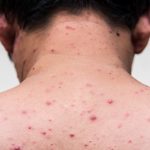Shingles vaccination
Shingles is caused by the same virus that causes chickenpox. It can cause fever and rash. Unlike chickenpox, shingles can reoccur and cause repeated bouts.
About the vaccine
- When to get vaccinated: The shingles vaccine is suitable for patients aged 50 years and over.
- How it is given: Injection in the upper arm.
- Course: The course consists of two doses.
- Boosters: Not required.
- Side effects: Side effects can include tiredness, fever, digestion problems, headache, pain, and at the injection site; redness, pain, swelling, and itching.
Prices
| Per Dose | £229.50 |
| Doses per course | 2 |
| Price per course | £459 |
How it Works
Attend your consultation
Get your treatment
Frequently Asked Question
About the shingles vaccine
Shingles is a viral infection of the nerve and surrounding skin, also known as herpes zoster. It is caused by a reactivation of the varicella-zoster virus, the same virus that causes chickenpox. Some of the symptoms of shingles are similar to the symptoms of chickenpox. They include a high temperature or fever, a headache and a characteristic rash which can be painful or itchy.
While you will usually only get chickenpox once in your life, the virus that causes it remains in your body. If it becomes active again at a later date, it causes shingles rather than chickenpox.
Your risk of getting shingles increases with age and you are more likely to get it if your immune system is weakened, for example due to illness or a medical procedure. While you can’t catch shingles from someone with chicken pox or shingles, you can pass on the chickenpox virus while you’re experiencing a bout of shingles.
The shingles vaccine protects against shingles and effectively reduces your risk of developing the condition. It is possible to develop shingles even if you have had the vaccine. If this happens, your symptoms should be milder and pass quicker as a result of the vaccination.
The shingles vaccine is not designed to protect against chickenpox.
How the shingles vaccine works
The shingles vaccine is a live vaccine, which means it contains a weakened version of the virus that causes shingles. It helps your immune system develop immunity to the virus, which reduces your risk of developing symptoms in the future.
You need two doses of the shingles vaccine, at least 8 weeks apart.
Side effects of the shingles vaccine
Like most vaccinations, the vaccine can cause side effects in some patients.
Possible side effects include:
- Headache
- Digestive problems
- Mild rash
- Pain, redness, itching, and/or swelling at the injection site
- Irritability
- Loss of appetite
- Muscle or joint pain
- Pain or swelling of the lymph nodes
Some patients experience a shingles- or chickenpox-like rash as a side effect of the vaccination. Although this rash is not usually contagious, you may be advised not to get vaccinated if you have close contact to someone who is at a high risk of contracting chickenpox as a result or someone to whom the virus would pose a serious risk.
Who can get vaccinated
The shingles vaccine is suitable for patients aged 50 years and over who have either had chickenpox or have received the chickenpox vaccine in the past.
If you have neither had chickenpox nor the vaccine, you are not at risk of developing shingles and the vaccine won’t be suitable for you. In this case, you could benefit from the chickenpox vaccine.
You will be unable to have the shingles vaccination if you have had one or more episodes of shingles in the last 12 months.
The vaccine is not suitable for you if you are pregnant or trying for a baby. You need to use contraception for at least 4 weeks after having received the vaccine. The vaccine is not advised for breastfeeding women.
The vaccine also won’t be right for you if you have certain medical conditions or are taking certain medications. This may be the case if you are taking medicines that affect your immune system or if you have recently taken medication for herpes.
The nurse or pharmacist will check your medical history and ensure the vaccine is safe and beneficial for you before administering the injection.
If you are ill on the day of your appointment, you need to reschedule.
Can you still have the shingles vaccine if you have had shingles or been exposed?
Yes, you can still have the shingles vaccine if you’ve had shingles. However, you should wait until your symptoms have stopped before you are considered for the shingles vaccine.
If you are immunocompetent (i.e. you have a properly working immune system) and have had a single episode of shingles in the last 12 months, you should delay your vaccination until 12 months after you were infected.





